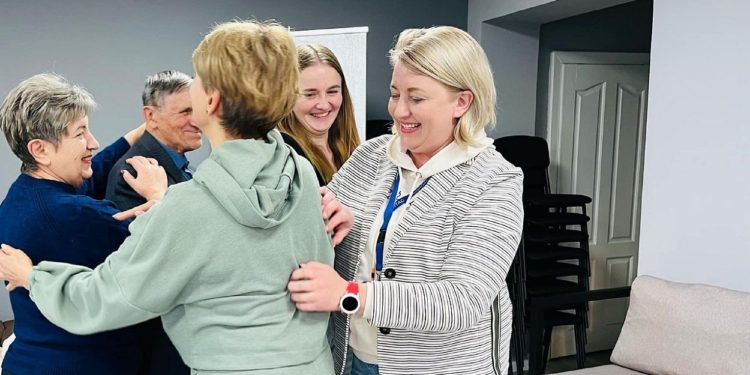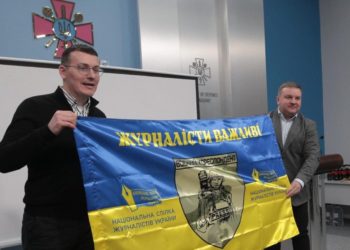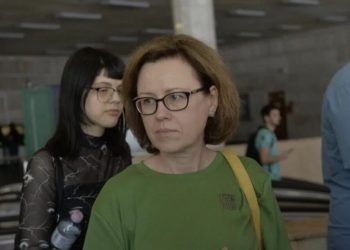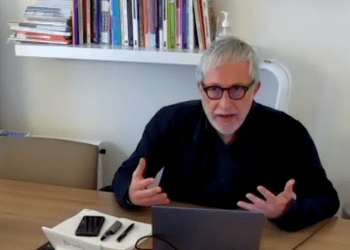With the support of the Ivano-Frankivsk Journalists’ Solidarity Center (JSC) of the National Union of Journalists of Ukraine (NUJU), a series of training sessions on psychological assistance for media professionals was organized in the Prykarpattia region. The trainer is Tetiana Bieliavtseva, a specialist at the Center for Resilience and a displaced journalist from the Kharkiv Region. This is the fourth training she has conducted in the city of Kolomyia for fellow media professionals. This time, in addition to local journalists, the event was attended by Viktoriya Plakhta, the coordinator of the Ivano-Frankivsk JSC, and Bohdana Zasidko, an assistant at the Center.
The training focused on conflict management. As Tetiana Bieliavtseva noted, this problem worries many people because, from time to time, we all conflict – at home, at work, at school, and on the street.
What is important to know in order to manage the conflict process?
It is important to know your true emotions, motives, and needs for which you enter into a conflict and try to find out the motives and needs of the other party.
It is advisable, if possible, to talk about your goals, reasons for actions, and needs because hidden; latent conflicts can drag on and turn into aggravated ones and significantly reduce the quality of life of everyone around you.
It is also worth asking and clarifying the need of another without manipulation – this is a good way to clarify the situation if, for example, you are facing a person who is ready for dialogue. In the case when you are facing a person who does not have the desire to enter into a dialogue and peacefully clarify the subtleties of communication, understanding the needs of another, then you can manage the process only by understanding other people’s interests and needs, which the person did not even admit to himself.
Universal advice from Tetiana Bieliavtseva:
- the ability to listen to yourself and others;
- to hear and understand people’s needs;
- to develop emotional intelligence (the ability to recognize and manage your own and other people’s emotions). Also – to pause for ten seconds and take a deep breath before saying something painful and unpleasant to another person – is also a skill that can be useful many times.
The coordinator of the Ivano-Frankivsk JSC, Viktoriya Plakhta, informed the training participants about the holding of psychological assistance events for media workers and their family members on the basis of the Center, which take place in a mixed format – offline / online. She also called on colleagues to contact, if necessary, psychologists who cooperate with the Center on problematic issues.
Call the Ivano-Frankivsk JSC at 066 677 0726 (Viktoriya Plakhta, the coordinator of the Ivano-Frankivsk Center). The Center is located at 25 Sichovykh Striltsiv Street.
About JSC
The Journalists’ Solidarity Centers are an initiative of the NUJU implemented with the support of the International and European Federations of Journalists, as well as UNESCO. The initiative is designed to help media representatives working in Ukraine during the war. The JSCs operate in Kyiv, Lviv, Ivano-Frankivsk, Chernivtsi, Zaporizhzhia, and Dnipro and provide journalists with organizational, technical, legal, psychological, and other types of assistance.
About UNESCO
UNESCO is the United Nations Educational, Scientific and Cultural Organization. It contributes to peace and security by promoting international cooperation in education, sciences, culture, communication, and information. UNESCO promotes knowledge sharing and the free flow of ideas to accelerate mutual understanding. It is the coordinator of the UN Action Plan on the Safety of Journalists and the Issue of Impunity, which aims to create a free and safe environment for journalists and media workers, thus strengthening peace, democracy, and sustainable development worldwide. UNESCO is working closely with its partner organizations in Ukraine to provide support to journalists on the ground.
The designations employed and the presentation of material throughout this digest do not imply the expression of any opinion whatsoever on the part of UNESCO concerning the legal status of any country, territory, city, or area or its authorities or concerning the delimitation of its frontiers or boundaries.
The authors are responsible for the choice and the presentation of the facts contained in this digest and for the opinions expressed therein, which are not necessarily those of UNESCO and do not commit the Organization.
Ivano-Frankivsk JSC information service

 THE NATIONAL UNION OF
JOURNALISTS OF UKRAINE
THE NATIONAL UNION OF
JOURNALISTS OF UKRAINE
















Discussion about this post